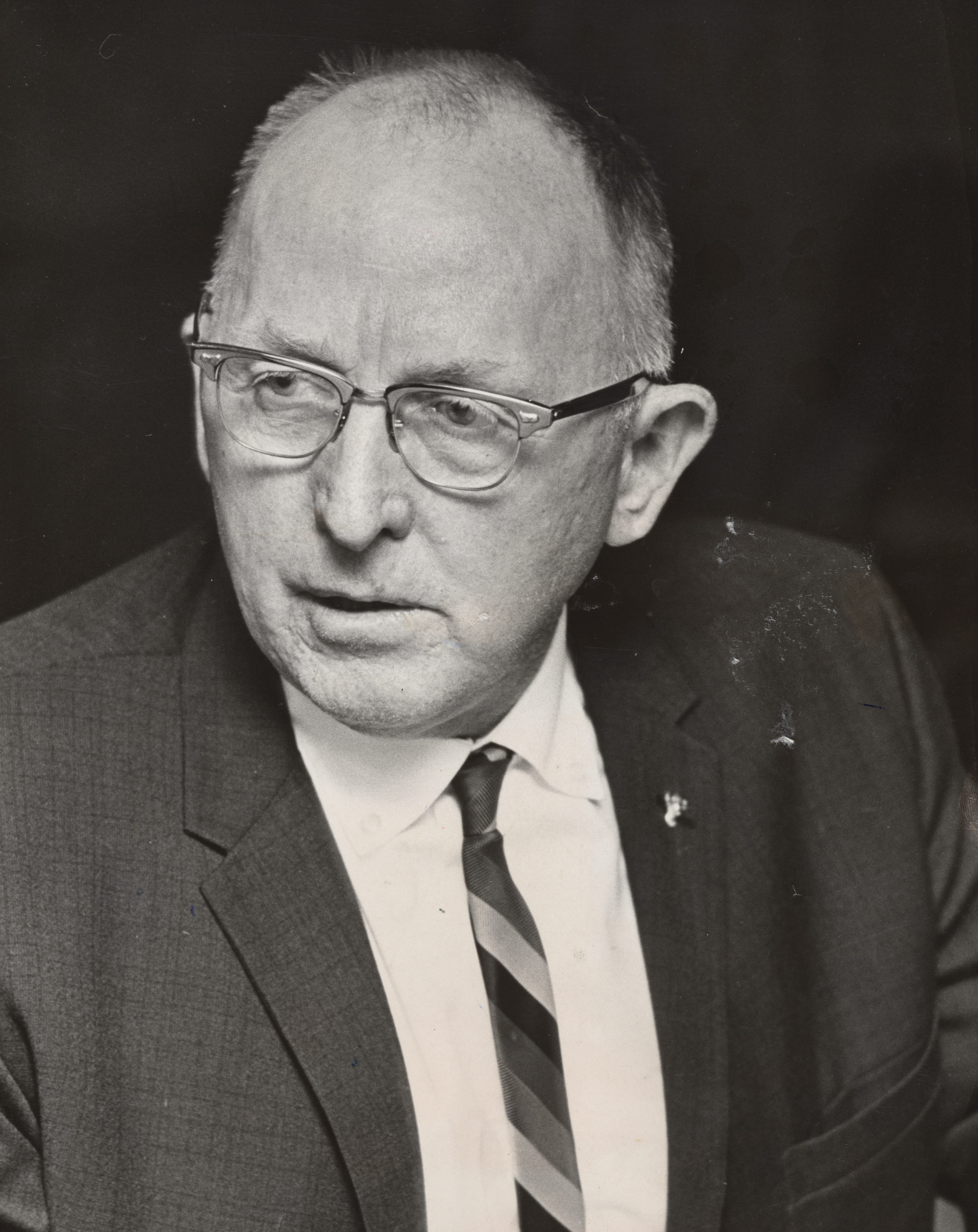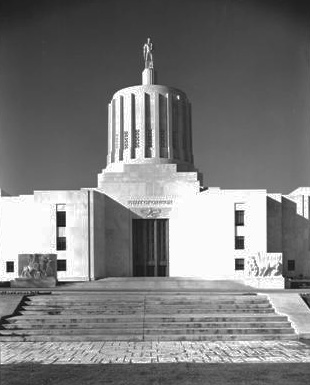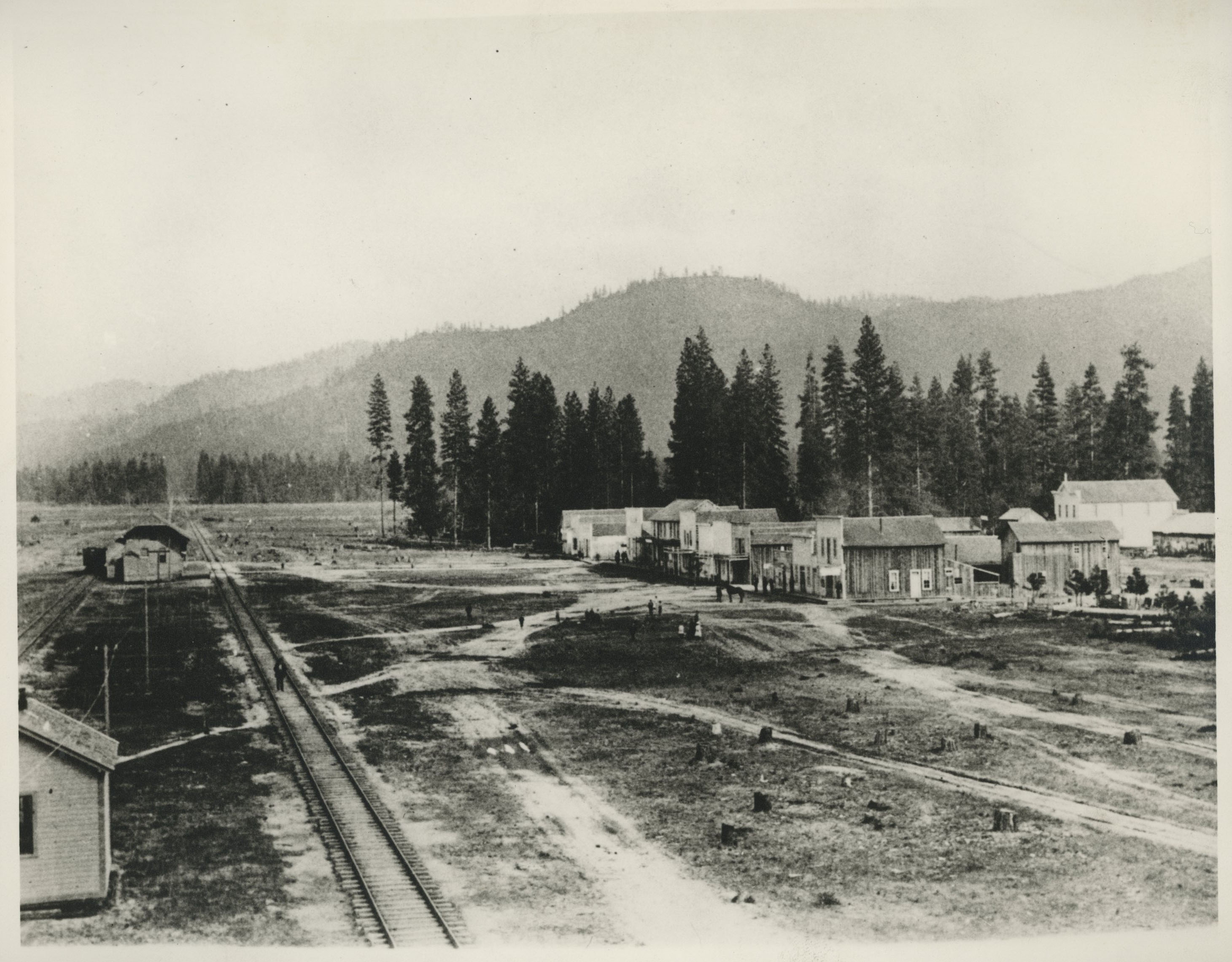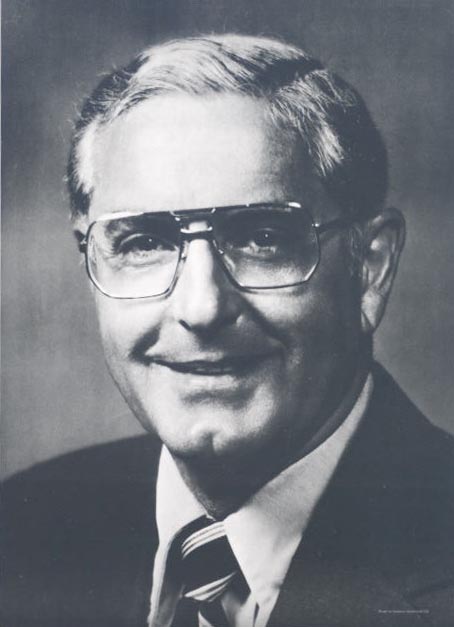In a long career of public service, Eugene Debs Potts was a mayor, state senator and senate president, and acting governor. He was also the first chair of the Oregon State Lottery Commission and the founder of the Josephine County tourist attraction that bears his name, Pottsville.
Potts was born in 1909 in the Buzzard Roost logging camp in Shasta County, California, when his parents were on their way to Oregon. He was the second of four children of Charles Reynolds “Machinery” Potts and Lulu H. Fisher Potts. Named after socialist and labor organizer Eugene V. Debs, Potts was known as Debbs, his middle name with an extra “b.”
Debbs Potts grew up in southern Oregon, attending schools in Summer Lake and Paisley before graduating from Grants Pass Union High School in 1928. After working as an airborne photographer for the U.S. Forest Service and in the sawmill business in Bonanza, Poe Valley, Keno, and Klamath Falls, he went into business with his father, who was a blacksmith and millwright. The two established Potts Machinery in Klamath Falls in 1932 and later partnered in building sawmills. In 1935, Potts married Bobbye Irene Michael, who later worked for her husband in the Oregon State Senate. Bobbye Potts died in 1988, and Potts married Ruth Gibson Phelps in 1994.
Potts had a long interest in local politics, running unsuccessfully for the Klamath Falls City Council in 1936 and 1938. After World War II, when he served as a chief petty officer in the U.S. Navy, he moved to Grants Pass, where he served two years as mayor before being elected to the State Senate in 1960. While in the Senate, he continued to pursue his business interests, investing in and managing sawmills and other enterprises, including the Hawthorne Memorial Cemetery in Grants Pass.
Despite his nickname and namesake, Potts was a conservative Democrat, and he and other rural Democrats in the Senate held the balance of power between Republicans and urban Democrats. Bipartisanship, diligence, and a folksy style served him well, and he was elected Senate president for two legislative sessions in 1967 and 1969. In 1971, Senate Democrats proposed Portland Senator Berkeley Lent as president. Potts voted with the Republican minority, resulting in a twelve-day deadlock before a third Democrat, John Burns, was elected on the fifty-fourth ballot.
Until 1972, the president of the Oregon Senate was acting governor when the governor was out of the state, and Potts served a total of 196 days in that role, sometimes making appointments and signing bills. The usually routine duties took a turn for the dramatic in March 1968, when seven hundred inmates took control of the Oregon State Penitentiary, holding forty guards and staff hostage. As acting governor, Potts was on scene for the suppression of the riot, which ended without loss of life.
Potts remained in the Senate for twenty-four years, though he introduced few bills and rarely participated in floor debate. He once explained that his proudest achievement was “the ability to work with any group.” He ran unopposed for many of those years, which allowed him to campaign using his own funds and to claim that he never took political donations. In 1984, at the age of seventy-six, Potts was finally defeated by Republican Bill Olson, who turned his longevity against him. Olson won a close election by about 2,500 votes, but was recalled in 1988 after pleading guilty to misdemeanor sexual abuse. Potts went on to a new phase of his career, as the first head the new State Lottery Commission.
After Oregon voters approved a state-run lottery in 1984, Governor Vic Atiyeh appointed Potts chair of the commission that administered the lottery. As a senator, Potts had opposed legalized gambling, but he nevertheless helped make the lottery a nearly billion-dollar source of state revenue. After nineteen years as chair, Potts retired in 2003.
Potts was a lifelong collector of historical artifacts, large and small. By the late 1950s, he had accumulated everything from stagecoaches and classic cars to blacksmithing tools and a safe from the state capitol that had burned in 1935. In 1959, to commemorate the Oregon centennial, he converted thirty acres that he owned along Pleasant Valley Road, just north of Merlin, to a historic replica town called Pottsville.
Debbs Potts died at his home in Merlin on December 19, 2003, just a few days after his ninety-fourth birthday and less than a month after retiring. Among his many recognitions are the Debbs Potts Oregon State Lottery Commission Building in Salem and the E.D. "Debbs" Potts Memorial Bridge in Grants Pass. The Eugene Debbs Potts Foundation was formed in 2005 to preserve Potts’s dream of “a home of Oregon memories,” and the Pottsville Historical Museum and Pioneer Town now includes a schoolhouse, country store, library, church, blacksmith shop, and hotel.
-
![]()
"Debbs" Potts.
Courtesy Oregon Hist. Soc. Research Lib., 018030
-
![Central block of the State Capitol building, about 1939.]()
State Capitol, ca. 1939.
Central block of the State Capitol building, about 1939. Oreg. Dept. of Trans., Travel Div., 1474
Related Entries
-
![Grants Pass]()
Grants Pass
Located on the Rogue River about thirty miles northwest of Medford, Gra…
-
![Oregon State Penitentiary]()
Oregon State Penitentiary
The Oregon State Penitentiary, Oregon's only maximum-security prison, s…
-
![Thomas William Lawson McCall (1913-1983)]()
Thomas William Lawson McCall (1913-1983)
Tom McCall, more than any leader of his era, shaped the identity of mod…
-
![Victor Atiyeh (1923-2014 )]()
Victor Atiyeh (1923-2014 )
Victor George Atiyeh was governor of Oregon from 1979 to 1987. The firs…
Map This on the Oregon History WayFinder
The Oregon History Wayfinder is an interactive map that identifies significant places, people, and events in Oregon history.
Further Reading
“Conservative to Continue Control of Oregon Senate” Albany Democrat-Herald, December 18, 1968, p. 9.
“Chairman of Lottery Calls it a Career.” Statesman Journal November 22, 2003.
“Acting Governor Digs Graves for Exercise.” Albany Democrat-Herald, February 23, 1968, p. 12.
Fattig, Paul “Keeping the past alive in Pottsville.” Medford Mail Tribune, June 16, 2009.
Kulongoski, Ted. “Eulogy for Debbs Potts,” February 2, 2004. https://votesmart.org/public-statement/30264/eulogy-for-debbs-potts#.XhyzcK3Mxqw






